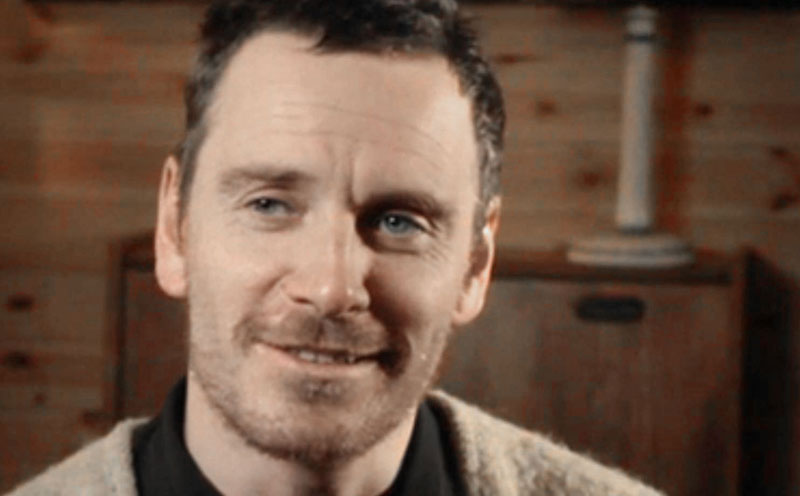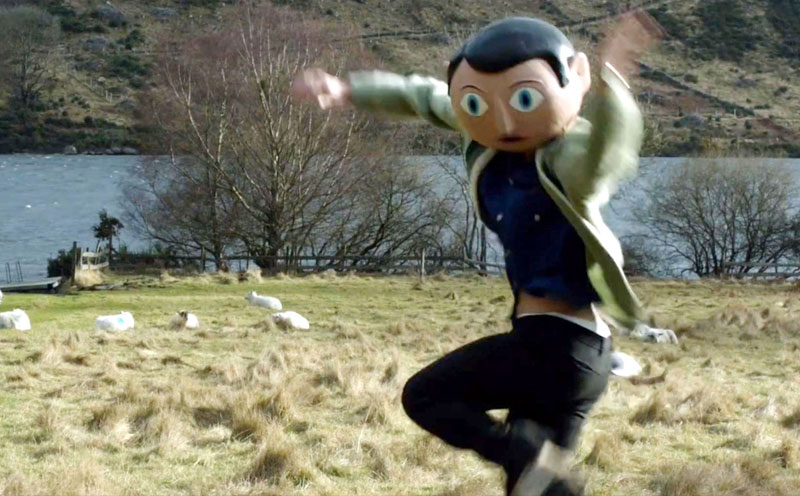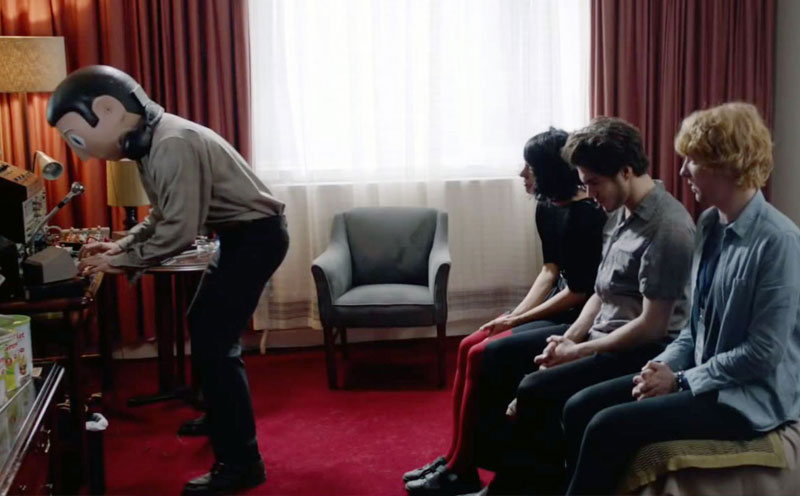
|

|

|

|

|

|

|

|

|

|

|

|


he kooky, far-out tale of musical genius Frank Sidebottom – the laconic prodigy who hides under a papier-mache head – is in cinemas today. We're celebrating the musical caper with Frank Day, an in-depth look at how the comic persona and frontman of The Freshies made it to the big screen.
Michael Fassbender is one of the most in-demand actors working today, but although he plays the eponymous character in Frank, he spends most of the film in disguise. Quite a departure from his member-swinging days in Shame. Cast as an avant-garde rock musician – inspired by comedian-musician Chris Sievey's alter ego, Frank Sidebottom, Fassbender's famous mug is hidden under a papier-mache head for almost all of Lenny Abrahamson's offbeat dark comedy. The film gives the 12 Years A Slave star his craziest role to date. We talked to him about Frank the character and being scared shitless by the Shakespeare play that actors dare not name.
Frank must be the oddest character you have played, or is there an odder one hidden somewhere in your past?
Michael: No, I think it's fair to say he is an original. I suppose that's why I was drawn to it. I think the script is such an original piece, and an unusual piece. I found it a touching piece as well. And then, of course, there was Lenny; I loved Lenny's work. So it was an easy decision. I just wanted to do it immediately.
Did you see any irony in the guy who famously appeared naked in Shame being cast in a movie where he is covered from head to foot for almost the entire running time? And which is the more uncomfortable, being covered up or walking around nude?
Michael: Probably wearing a head is easier. (Smiles) I'm not going to say the other. And no, I'm not really that reflective, to be honest, to see the irony in it. I just thought, 'This is fun, quirky and unusual.' And it was just exciting, really.
What specifically appealed to you about the character?
Michael: Yeah, I thought it would be interesting to do some mask work and explore that, and this was a great opportunity to do that. It was just, like I say, such an unusual concept, but it didn't seem to me to be implausible. And then there was the challenge of finding the character under the mask, which was a very interesting journey. We used lots of different influences, but Daniel Johnston was a big one for me. And then, you know, dealing with this idea of mental illness, which was a big one. So to just juggle all those things seemed like a good challenge.
Was Frank's mental illness a specific condition that you could research?
Michael: Yeah, there was certain research. I also talked to my sister [Catherine, a neuropsychologist]. But then I also formed my idea of it. Whether there is an actual condition like the one that I sort of put together, I doubt it. But that's not in any way being flippant with the condition. I just had to formulate a character for myself and believe in it. Obviously there's a lot of social anxiety at the crux of it.

You mentioned Daniel Johnston. What influence did he have?
Michael: There was a lot of footage of him that I could pull up on the internet for certain scenes. There was a frailty there, especially in the scenes later in the film where Frank starts to unravel a little bit. Trying to find that was a tricky thing. You know, how he can start to unravel and how that was going to manifest itself physically in the way that he starts delivering his speech and everything else. That section, I think, was the trickiest bit. How to pitch the meltdown and how it sort of goes and gradually pops.
Did you take any inspiration from anyone for the singing? I thought you sounded like Jim Morrison at the beginning of the final song, I Love You All.
Michael: Yeah, when we were in there as well there was another song that came out that sounded like that. And then there was another recording that sounded a bit like John Lydon. It's just me blatantly stealing (laughs). I don't know, maybe the influences were coming out of me unknowingly, because that just sort of happened. We got together and went into a studio three weeks before Christmas and rehearsed as a band and started playing the songs that Stephen Rennicks had put together so well, I thought, and then gave us the freedom to play within that. Things just started happening and that was the sound that we came up with.
Had you sung before?
Michael: Yeah, but pretty badly. I've tinkered around with the guitar on and off for many years, with very little improvement. I'm basic but I can play a little bit. And, you know, singing around the house, in the shower, the same as anybody else. But I do like music and on set, every now and again, break into falsetto (laughs).
Do you ever use music to help you find a mood on a movie?
Michael: I used to do that, but not so much any more. I mean music is very important to me in terms of the rhythm of a piece, of a scene, because you can just tell when the rhythms are jarring or when they're singing and it's sort of ringing true. So music, I think, is always very important to me just in terms of work in general.
The recording session in Frank is great because it's all these disparate people pulling something coherent together out of chaos. Can a film set feel like that?
Michael: Yeah, I think it's a big ask. A big group of people are coming together, some that have never met each other before, let alone worked with each other, and then there're lots of things that can come into play: weather, equipment, performances. So there's a lot of variables that can go wrong, yeah. It's a pretty amazing thing, and I really enjoy that aspect of it. Just people coming together and working, because the finishing line is going to be there and we're going to have to cross it because we're on something that is moving. It's not stationary. So let's just hope the work gets done by the time we cross the line. It can be pretty chaotic. It depends who the captain of the ship is, too, of course (laughs).

You have started your own production company. Is that because you wanted more control? Have you ever found yourself on a movie set thinking the movie you're making isn't the one you thought you'd signed on for?
Michael: Listen, I think that happens in every job. I'm sure you sometimes go back and think, 'Oh, what are they running that story for?' Everybody has opinions but unless you're in charge it's just an opinion, and everybody's got one. For so long I concentrated on the acting and it was important to do that while I tried to break through into that. And now, thankfully, and very luckily, I am in this position. So now I want to be learning more and trying other things, and I'm working with writers on earlier stages and developing stuff, because it's fun. I enjoy it.
When you choose roles, do you look for things that scare you a bit?
Michael: No, because then something like a Scottish play comes along (he is appearing in a film adaptation of Macbeth) and that scares the shit out of me. And it's an opportunity that I can't say no to. But it's not always about, 'God, where is the next thing that is going to scare me?' It's just about a good story. If I read a story and go, 'God, that's a good story, I'd like to see that. Maybe other people would like to see that story,' that's, really, the basis of it. That, and then the director that's telling the story. So they're the two things that decide. Trust me, I want to have a nice time and not be scared. It's about good stories and 12 Years – and of course it's Steve (McQueen), and I'd do anything with Steve – was such a great story. I was like, 'I want to be a part of this story and I'd love to be given the opportunity and the responsibility to play this character in that story.'
Because of the work that you have done, is it unusual for comedies to come across your desk?
Michael: Well, I try to bring it in. Like Prometheus, I tried to bring comedy in there. In Inglorious Basterds (laughs), I tried to get comedy in there. Yeah, there are lighter scripts that come in. Thankfully, comedies do come in. I really want to try more comedies, for sure. Again, it's about good stories, regardless. And I don't mind what genre they come in or what type of character they come in. Or what format, even. Whether it's television, film, theatre, whatever. So yeah, there's a lighter element in Frank.
Do you find it easy to let go of characters after a film's wrapped and have there ever been ones that you wished you could hang on to for longer?
Michael: Probably the heroic ones you want to stick around a little bit longer with and the ones that aren't so nice you try and get rid of. They don't hang around too much. Maybe they will all come out when I actually stop and I will be in, like, one sort of weird charades show by myself. But, you know, I move on to another job and go straight into prep for that and there's not much time. And through doing the filming, each time it's like, 'Oh, there's that scene,' and it's been part of your homework for so long, things just kind of get shuffled away. Also, so much work has been done before and during that I feel like I can happily walk away from it.
